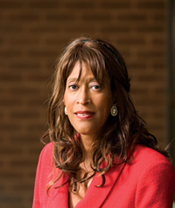Safety Net

Pamila Brown.
Photo by Ron Aira
Legislation moving through Congress would authorize the ABA to create a nationwide network of volunteer lawyers to represent victims of domestic violence.
Similar bipartisan bills in the Senate and the House of Representatives call for the ABA Commission on Domestic Violence to create and maintain the National Domestic Violence Volunteer Attorney Network.
Sponsors of the bills hope the commission would be able to mobilize as many as 100,000 volunteer lawyers to represent domestic violence victims, thousands of whom go without legal counsel every year.
Currently, legal services for domestic violence victims come largely from a patchwork of legal services lawyers, state-level domestic violence coalitions, law school clinics and private attorneys.
The bills in Congress envision a more comprehensive network organized by the Domestic Violence Commission in which a coordinator in each state would link clients and lawyers. In addition to maintaining the overall network, the commission would coordinate training, mentoring and technical services for lawyers participating in the network.
The Senate version of the National Domestic Violence Volunteer Attorney Network Act (S. 1515) was reported out of committee in mid-May, prompting praise from ABA President William H. Neukom of Seattle.
“Thousands of victims of domestic violence go without legal representation every year—something that so many of us take for granted,” said Neukom after the committee’s action. “Every day lives are at risk because we do not adequately protect or advocate for victims of domestic violence. This legislation, if passed, can save lives and shield the innocent from violence.”
The Senate bill is sponsored by Sens. Joseph R. Biden Jr., D-Del., and Arlen Specter, R-Pa. The House bill (H.R. 6088) is sponsored by Reps. John Conyers Jr., D-Mich., and Ted Poe, R-Texas. That bill is pending in the House Judiciary Committee.
COORDINATED APPROACH
The domestic violence commission would organize the volunteer attorney network in coordination with the ABA Standing Committee on Pro Bono and Public Service, along with other domestic violence and pro bono organizations. The bill would authorize Congress to award grants to fund those efforts.
The Senate bill calls for additional funding to go to the National Domestic Violence Hotline for updating its system and training advocates on how to provide legal referrals to lawyers in the network being set up by the ABA.
The hotline, a nonprofit organization established in 1996 as a component of the 1994 Violence Against Women Act, received 236,907 calls from victims of domestic violence in 2007. The second most frequent reason victims called the hotline was to ask for legal help.
“We all know that access to legal services is key to combating domestic violence,” says Pamila J. Brown, a state district court judge in Ellicott City, Md., who chairs the Domestic Violence Commission. “This legislation would go a long way toward providing resources for victims by allowing facilitation of training for attorneys and providing victims with access to needed services.”
The bill calls for the volunteer attorney network to be introduced in five states, then be implemented nationwide over the following few years —with funding from Congress to support startup efforts in the states.
Overall guidance for the volunteer attorney network and referral project would be provided by a domestic violence legal advisory task force that would report to Congress every two years.
The legislation also calls for the National Institute of Justice to conduct a study of the scope and quality of legal representation and advocacy for victims of domestic violence, dating violence and stalking, including how those services accommodate cultural and linguistic factors.
This column is written by the ABA Governmental Affairs Office and discusses advocacy efforts by teh ABA relating to issues being addressed by Congress and the executive branch of the federal government.
Rhonda McMillion is editor of Washington Letter, an ABA Governmental Affairs Office publication.



